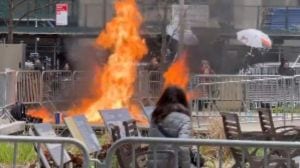- India
- International
Banaskantha: Tradition skews gender ratio in voter list
In a district where a sizeable section of women still observe purdah, fewer women enlist in the voter list. Most of the women are restricted to household chores, and exposure to the outside world is limited to their farmland.
 Sangeeta Karamta makes tea for the visiting BLOs at her home in Dedha village.(Express Photo by Javed Raja)
Sangeeta Karamta makes tea for the visiting BLOs at her home in Dedha village.(Express Photo by Javed Raja)
“How will getting a (voter ID) card help me? Will our family get more financial help from the government,” asked 19-year-old Nita Karamta to a booth-level officer, who had arrived at her house in Dedha village of Banaskantha district as part of voter registration exercise, a day before the flood hit the district. When the BLO answers in the negative, she proded, “What if my husband or in-laws do not like me getting registered as a voter?”
Nita, who belongs to Rabari community of cattle herders, had dropped out of school after class VI. Her neigbour 26-year-old Sangeeta Karamta, who is married, like Nita has no idea about the upcoming elections in the state, and she is also reluctant to enrol as a voter. “They (BLOs) visit us regularly and ask me to submit my documents. I am yet to do so. I cannot understand how it is going to help me or my family,” says Sangeeta as she gets busy in preparing tea for the visiting officials.
In a district where a sizeable section of women still observe purdah, fewer women enlist in the voter list. Most of the women are restricted to household chores, and exposure to the outside world is limited to their farmland. Dedha falls in Dhanera taluka of Banaskantha district, bordering Rajasthan, and has two polling booths with 1,312 registered voters. Of this, a little over 44 per cent are women. In January, when the final list of voters was prepared, women formed only 37 per cent of 4.48 lakh first-time voters in the 18-19 age group. Of the 22,077 new voters (18-19 years age group) added in the entire district, only 6,748 were women.
According to P P Patel, Prant Officer at Dhanera, there are 10-odd villages in the taluka where women voter enrollment is very low. “The gender ratio among the voters is the lowest among Rajputs, Rabaris and Dalits. The women in these communities follow certain customs and so it becomes difficult in convincing them,” Patel added. The only primary school in the Dedha village, however, throws up a different picture. There are 102 girls against 81 boys in Classes from 1 to 5. But the trend reverses in Classes 6 to 7 where there are only 55 girls and 57 boys.
“Most of the villagers here send the boys to good schools outside the village, but the girls drop out of school to assist their families,” said Kaushik Patel, a teacher at the school. Daughters of the most influential families in the village are also not left untouched. A leader of the community in Dedha, Gokulbhai Aal, who has one of the biggest houses in the village fitted with a DTH and air-coolers, has filed an application to enroll his 19-year daughter and 21-year-old son on the voters list. However, he has refused to enroll his second daughter who is 20 years old. “My eldest daughter Komal will get married any day, so I am not enrolling her. My youngest Maya was always good at academics. She is the perhaps the only girl to have gone to college which is near Dhanera, about 20 km from here. However, I had to force her to drop studies in the first year of college due to pressure from the community members,” said Aal whose son is studying to become an engineer.

Bhavnaben Shrimali, who comes from a Dalit family, also refused to get enrolled for “pressure from community”. Since July 1, the officials have added 41 new voters. Of them only 14 are women. “Our focus is on enrolling more girls, especially in the 18-19 years age group. There are families to whom I have been visiting on a regular basis trying to convince them to add their daughters to the voters list. Most of them marry off their daughters by the age of 21 and they want their daughters to get registered as a voter only after that,” Patel said.
The situation is very similar in neighbouring Raviya village where 30 per cent of the population are Rajputs. Of the 16 new applications received for voter enrollment in July, only four are women. “Among the Rajputs, it is only the men who talk. The women observe purdah and we find it difficult to get direct access to them. So knowing their views or convincing them is out of question,” said Lalit Joshi, the booth-level officer in the village.
Apr 19: Latest News
- 01
- 02
- 03
- 04
- 05






































